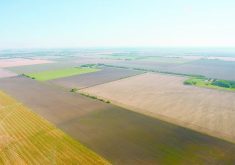Regina couple fulfilled their dream by spending six months on a community-shared agricultural operation
The view on the dusty dirt road to the Ternier’s family farm near Cochin, Sask., overlooking the Murray Lake Bird Sanctuary, takes one’s breath away.
The rising sun crests over rolling hills only to dip over the lake in the evenings. Noises from pelicans, chickens, pigs, and cattle fill the air along with the wild smells of flowers, freshly dug earth and manure.
Spending six months at Judy Ternier’s farm was an experiment for an experiment for Matthew Dipple and Serena La Posta of Regina to see if farming is the life they want.
Read Also

Sustainable food has ‘lost all meaning’: prof
That marketing strategy is deader than a doornail, says a University of Guelph professor who specializes in consumer preferences and perceptions of agriculture and food.
This is not exactly a new scene for the husband and wife duo, but they wanted the chance to compare this life to days normally filled with Regina traffic, concrete sidewalks and city noises.
“We kept putting this dream on the back burner. Now it is our time to dive in for a full season, get our hands dirty and give it a try,” said La Posta back in July.
From May 11 to Oct. 6, the pair were farming interns as Ternier put them to work on her community-shared agriculture operation. Four garden plots are used to grow fresh, organic produce for the Battlefords area and some families in Saskatoon, as well as pasture land and hay fields for their small herds of livestock, including cattle, pigs, sheep and chickens.
Sharing this life with the community and getting community members out to her farm became the much-welcomed part of her life when she expanded her garden in 1995, she says.
Since then, the farm itself has become its own community with two branches of the Ternier family, including third-generation Ternier farmers, Johnny Burns and Rochelle Ternier. Judy Ternier was housed in a bachelor suite mini-home no bigger than some people’s living rooms throughout La Posta and Dipple’s stay. They were a welcome addition to the operation, said Ternier.
But moving to the farm has its changes and La Posta and Dipple had a lot to consider while conducting their experiment.
Living arrangements were vastly different from their home in Regina, says Dipple.
The farm is a mix of the modern and the ancestral with solar panels and outhouses standing side by side, while the wood stove and breaker panel share the same wall in La Posta and Dipple’s farmhouse. The open concept mini-home is divided into a small kitchen and living area, but a community hall on the property used for large suppers and themed gatherings, including board game and bible study nights, provided even more gathering space for all the families on the property.
During their time at the Ternier farm, their house was cozy and had everything they needed, even if it had its differences to a modern home.
Now, they have a separate room for everything they do, says Dipple. After leaving the Terniers, so much space didn’t feel necessary.
Rural life can be isolating, says La Posta, but community living and working with the other members of the farm had to be appealing.
The pair have always had an interest in sustainable farming, says La Posta, supporting local farmers markets and gardening as much as they could within their Regina yard. Knowing where their food comes from is important to both of them and the desire to explore agriculture at the source has always been there, she says.
Ternier gave them the opportunity to try it for themselves. Learning the reality of food production is something she wants people to learn coming to her farm.
La Posta and Dipple already had a strong sense of that before coming but there were new things for them to learn.
With a small-scale garden in Regina, it’s easy to feel overwhelmed in the city with six tomato plants, Dipple laughs, so learning to garden on the Ternier farm’s scale of four large plots for multiple families was very different.
“The fact that they’re doing vegetable gardens but yet, they’re also doing a lot of stock for their own use, and milking, and eggs, and haying. There are lots of different skills we could learn.”
From seeding to planting, Dipple and La Posta worked with Ternier taking care of chickens, planting, weeding, and harvesting vegetables.
Dipple also learned from Burns how to milk by hand and make hay. While it is hard work, it has also been fun, he says.
“The wonder of all the different vegetables and getting to know food in a way that one doesn’t necessarily think of until they grow it, for me, it’s full of wonder and it’s something that I’ve appreciated,” says Dipple.
No matter how much wonder they took from experience or how much the farm became a second home to them, everything must come to an end.
Following the final harvest, Dipple and La Posta returned to Regina to live full time. It was bittersweet, said Dipple, since they were happy to return home, but they will miss the farm.
Even without indoor plumbing, it is a great way to live, says Ternier, and inviting people to her farm has meant showing people a new way of life. More small scale houses dot the property for long term living so having other people come to experience this life is completely possible.
“So few people have an opportunity to see it,” says Ternier, and the extra help is always welcome.
But even this experience could be coming to an end. Ternier is in the process of retiring and leaving the farm to Burns and the gardens to Sanford Beck. While she hopes they decide to continue with community shared agriculture and sharing this experience with others, she knows that it is their call to make in the future.
“I would be heartbroken if our farm became a bigger, conventional, commercial operation but I have a sense that I’ve done what I can do. It’s out of my hands.”
For Dipple and La Posta, going back to stay full time is out of their hands as well. It was a wonderful dream for a summer but with Dipple’s career as an engineer with SaskPower and bills to be paid in Regina, the arrangements they had for their dream summer would not work long term, says Dipple.
No matter what the future holds, Dipple knows that the experiment was a success.
“It was gratifying at the end of the experience knowing this was a summer that we’ll never forget and it was where we were meant to be.”


















